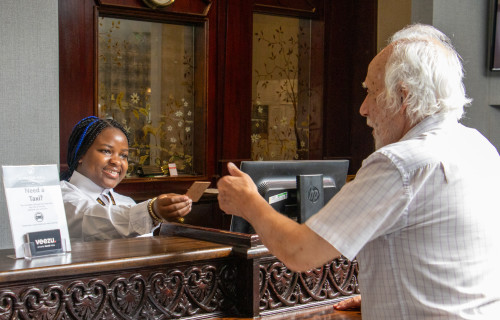T Level: Digital Support Services Level 3
- Ask a Question
-
Select an Option
-
3
Level
Level 3 -
Duration
2 years -
Start Date
September 2025 -
Venue
City College Norwich campus -
Course Code
A0534
What You Will Study
This T Level is a two year course which has been developed in collaboration with employers and businesses. It has been designed to meet the needs of the digital industry and will prepare you for a career in the Digital Sector. The T level will offer you a mixture of classroom learning and ‘on-the-job’ experience during an industry placement of at least 45 days (315 hours) and is equivalent to three A Levels.
The course is split into 2 sections: The Core and the Occupational Specialism.
Core Content (year 1)
You will gain core knowledge and develop a general understanding of digital from the following:
- how digital technologies impact business and market environment
- the ethical and moral implications of digital technology
- using data in software design
- using digital technologies to analyse and solve problems
- digital environments, including physical, virtual and cloud environments
- legal and regulatory obligations relating to digital technologies
- the privacy and confidentiality of personal data
- the technical, physical and human aspects of internet security
- planning digital projects
- testing software, hardware and data
- digital tools for project management and collaboration
You will also learn about topics specific to digital support services, including:
- roles within the digital support services sector
- communication in digital support services
- fault analysis and problem resolution
In addition to the core content, each student must choose one of the following specialisms:
- digital infrastructure
- digital support *
- Cyber Security *
*Possible delivery from Sept 2023
Why Choose City College Norwich?
Equivalent to 3 A Levels
T Levels are equivalent to three A Levels and are allocated UCAS tariff points.
Developed with industry
T Levels have been designed with leading employers and businesses. They will provide you with the skills to progress to an apprenticeship, university or skilled employment.
Academic and practical
80% will be academic and technical study at college. 20% will be practical experience gained with an employer as part of an industry placement.
Entry Requirements
Achieve 5 GCSE's at grade 4 or above, including English Language and maths, and if taken, GCSE Computer Science at grade 5 or above.
How You Will Be Assessed
Assessment will take place through a combination of externally set exams, an employer-set project in the 1st Year and endpoint Occupational Specialist assessment in the 2nd Year.
All assessment is external, written and set by the Awarding Body, NCFE.
- Year 1 Core is assessed with 2 written exams plus an Employer Set project which is a brief that relates to your specialism.
- Year 2 Occupational Specialism is assessed by one large ‘Integration Project’ that provides a business problem for you to analyse and solve.
Course Progression
Students who achieve this qualification could progress to the following, depending on their chosen occupational specialism:
- employment
- higher education
- apprenticeship
Where Your Course Can Take You
Career options might include becoming an infrastructure technician or a role in IT support. Students can progress into roles such as:
- IT SECURITY CO-ORDINATOR
- IT SUPPORT TECHNICIAN
Fees
If you are a UK or home fee status student and aged 16-18 on the 31st August before the start of your course, tuition fees are free.
Why Choose City College Norwich?
Equivalent to 3 A Levels
T Levels are equivalent to three A Levels and are allocated UCAS tariff points.
Developed with industry
T Levels have been designed with leading employers and businesses. They will provide you with the skills to progress to an apprenticeship, university or skilled employment.
Academic and practical
80% will be academic and technical study at college. 20% will be practical experience gained with an employer as part of an industry placement.
Similar Courses
T Level: Digital Software Development Level 3
Level 3, Full Time, 2 years
Delivered at City College Norwich campus
T Level Foundation Year Digital
Level 2, Full Time, 1 year
Delivered at City College Norwich campus
Information Communications Technician Apprenticeship Level 3 Standard
Level 3, Apprenticeship, 2 years
Delivered at City College Norwich campus
Network Engineer Level 4
Level 4, Apprenticeship, 2 years
Delivered at City College Norwich campus
Latest News
Our Introduction to Hospitality and Catering students have rounded off the year with a ‘takeover’ of Dunston Hall Hotel, Spa & Golf Resort.
Read more